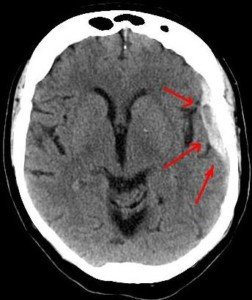
If you hit your head and don’t have immediate symptoms or even symptoms for a few weeks after, you can still develop symptoms of bleeding in the brain at least six weeks later that are the direct result of hitting your head.
Hit your head but everything is fine and you have no symptoms?
Mark the date you hit your head because you can still develop symptoms weeks later – six weeks later, even, from a very slow bleeding in your brain caused by the blunt trauma to your head.
This is what happened to my mother.
She blacked out (from a blood pressure drop) while standing in the bathroom, and collapsed from the loss of consciousness (which lasted only moments, but long enough to turn her body into dead weight) — hitting her head on the bathtub on the way down.
I heard the awful “THUD!” and rushed into the bathroom to see her lying on the floor (conscious), with her shoulders propped up against the side of the bathtub.
There was no way she could have ended up like that without hitting her head.
I examined her head and discovered a generous-sized matting of blood in her hair.
A few hours later in the ER she had a CAT scan that was normal.
The CAT scan was to see if there was bleeding on her brain (subdural hematoma).
Up to that point my mother reported no symptoms, not even a headache.
There was no nausea, dizziness, unsteadiness, slurred speech, vision problems or change in mental status.
She stayed overnight for observation and next morning, another CAT scan was normal.
I expressed concern about the possibility of a very slow bleeding that might start showing symptoms “a few months out.”
But the ER doctor said the chances of this were very tiny, and that the next-morning CAT scan results were very encouraging, and that there probably wouldn’t be any complications — but to keep a close watch on my mother over the next few days.
Over the next few days I kept a close watch: no symptoms, no headache, gait problems, slurred speech, cognitive changes, nothing.
I then completely forget about the idea that her hit on the head could cause any bleeding in the brain.
Until 6.1 weeks later.
The symptoms came out of the blue. She awakened at 7 am with a headache so bad that she was weeping.
It persisted. I did not connect the dots and think of the fall on her head six weeks prior.
I just thought it was one of her bad headaches (every now and then my mother has always reported a bad headache), and that the weeping was just her being overly-sensitive (she’d had quintuple bypass surgery 12 week prior and the recovery had been very bumpy).
The headache was so bad that my mother was unable to get ready for the day.
But I noticed that she had difficulty walking across the room; very weak. Then she upchucked.
Then I noticed her left leg had a slight drag to it.
It still did not occur to me that these symptoms were the result of a slow, delayed brain bleed from hitting her head six weeks ago. Instead, I thought it was a mild stroke.
So did the ER doctor. A CAT scan was ordered and the surprised ER doctor informed us that there was bleeding in the brain.
“Did you hit your head recently?” She asked my mother.
I said she fell about six weeks ago and hit her head on a hard surface.
The diagnosis was a chronic subdural hematoma.

Arrows show the bleeding in a patient with head trauma. Source: Lucien Monfils
And ultimately, the medical reports from two ER visits (this one and another one when the brain bleed recurred after the fluid was drained) named the fall in the bathroom as the cause of the chronic subdural hematoma.
Between the time my mother had hit her head, and the night before she awakened at 7 am with an excruciating headache, she had shown absolutely no symptoms characteristic of bleeding in the brain or head injury!
“Yes, everyone who hits their head traumatically should be evaluated by a physician,” says Danielle DonDiego, DO, a family physician with SteadyMD, an online program where patients can call, text or video chat with their doctor anytime.
“If there is any loss of consciousness, ‘worst headache of their life,’ confusion, feeling faint or vision changes — these are all major signs to go to the ER immediately.
“Even if someone loses consciousness and regains consciousness quickly, they could still have a head bleed that can be deadly. It’s always best to be evaluated,” especially if the individual is elderly, even if initially they don’t seem to have any symptoms and insist “I’m fine.”
Dr. DonDiego continues, “If a CT head is negative initially, especially in the elderly or someone taking blood thinners, and a slow worsening headache persists for days to weeks, it is possible there is a slow bleed, and a re-evaluation is necessary.
“Our veins weaken as we age, so they are likely to be higher risk for hemorrhages.”
If someone hits his or her head, they should record the date.
Any peculiar symptoms that occur even weeks later should be documented.
This includes nausea, vomiting or lingering dizziness.
A normal CAT scan 24 hours after getting hit in the head doesn’t mean that bleeding in the brain won’t eventually occur.
 Dr. DonDiego, who’s also a certified personal trainer, focuses on weight management, fitness, nutrition, reproductive health, preventive medicine and managing end stage disease. Learn more about SteadyMD.
Dr. DonDiego, who’s also a certified personal trainer, focuses on weight management, fitness, nutrition, reproductive health, preventive medicine and managing end stage disease. Learn more about SteadyMD.
 Lorra Garrick has been covering medical, fitness and cybersecurity topics for many years, having written thousands of articles for print magazines and websites, including as a ghostwriter. She’s also a former ACE-certified personal trainer.
Lorra Garrick has been covering medical, fitness and cybersecurity topics for many years, having written thousands of articles for print magazines and websites, including as a ghostwriter. She’s also a former ACE-certified personal trainer.
.









































